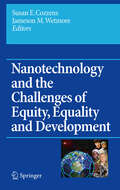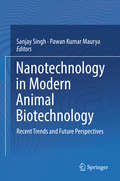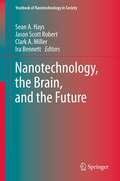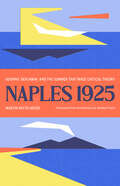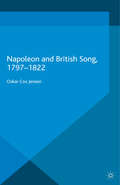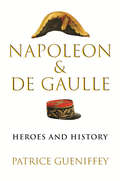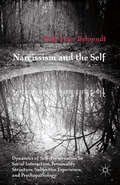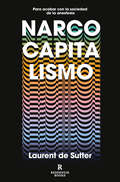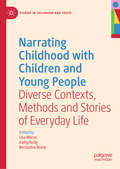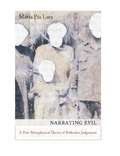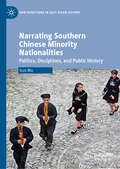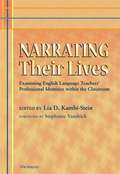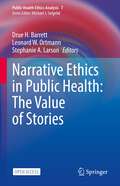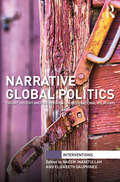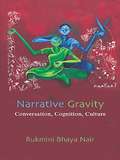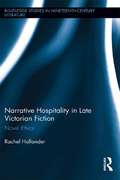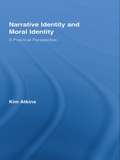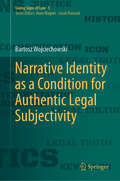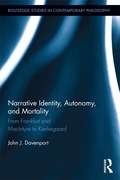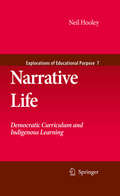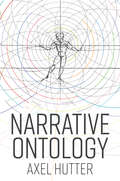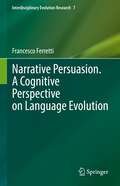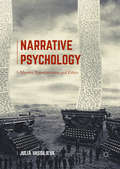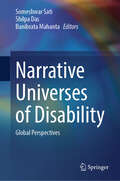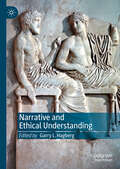- Table View
- List View
Nanotechnology and the Challenges of Equity, Equality and Development
by Susan E. Cozzens Jameson WetmoreNanotechnology is enabling applications in materials, microelectronics, health, and agriculture, which are projected to create the next big shift in production, comparable to the industrial revolution. Such major shifts always co-evolve with social relationships. This book focuses on how nanotechnologies might affect equity/equality in global society. Nanotechnologies are likely to open gaps by gender, ethnicity, race, and ability status, as well as between developed and developing countries, unless steps are taken now to create a different outcome. Organizations need to change their practices, and cultural ideas must be broadened if currently disadvantaged groups are to have a more equal position in nano-society rather than a more disadvantaged one. Economic structures are likely to shift in the nano-revolution, requiring policymakers and participatory processes to invent new institutions for social welfare, better suited to the new economic order than those of the past.
Nanotechnology in Modern Animal Biotechnology: Recent Trends and Future Perspectives
by Pawan Kumar Maurya Sanjay SinghThe book introduces the basic concepts of nanotechnology and the various technologies to characterize nanomaterials. It also covers the nanostructural features of mammalian cells/tissues and related nanomechanical properties. In addition, the book comprehensively describes the current state-of-the-art and future perspectives of nanotechnology in biosensors. It also discusses the potential of nanotechnology for delivering the diverse cancer therapeutics and illustrates its limitation due to the potential toxicity associated with oxidative stress. It also highlights the ethical issues and translational aspects related to nanotechnology. Finally, it summarizes the applications of nanotechnology in animal biotechnology, the recent perspectives and future challenges of nanomedicines. The content of the book are beneficial for the undergraduate, postgraduate and doctoral students as well the professionals working in the area of nanotechnology and nanomedicines.
Nanotechnology, the Brain, and the Future
by Jason Scott Robert Sean A. Hays Clark A. Miller Ira BennettOur brain is the source of everything that makes us human: language, creativity, rationality, emotion, communication, culture, politics. The neurosciences have given us, in recent decades, fundamental new insights into how the brain works and what that means for how we see ourselves as individuals and as communities. Now - with the help of new advances in nanotechnology - brain science proposes to go further: to study its molecular foundations, to repair brain functions, to create mind-machine interfaces, and to enhance human mental capacities in radical ways. This book explores the convergence of these two revolutionary scientific fields and the implications of this convergence for the future of human societies. In the process, the book offers a significant new approach to technology assessment, one which operates in real-time, alongside the innovation process, to inform the ways in which new fields of science and technology emerge in, get shaped by, and help shape human societies.
Naples 1925: Adorno, Benjamin, and the Summer That Made Critical Theory (The Margellos World Republic of Letters)
by Martin MittelmeierThe untold story of how the volcanic landscape surrounding Naples influenced a crucial moment in twentieth-century intellectual history &“Well-written—and well-translated.&”—Dominic Green, Wall Street Journal In the 1920s, the Gulf of Naples was a magnet for European intellectuals in search of places as yet untouched by modernity. Among the revolutionaries, artists, and thinkers drawn to Naples were numerous scholars at a formative stage in their journeys: Walter Benjamin, Siegfried Kracauer, Alfred Sohn‑Rethel, Asja Lacis, Theodor W. Adorno, and many others. While all were indelibly shaped by the volcanic Neapolitan landscape, it was Benjamin who first probed the relationship between the porous landscape and the local culture. But Adorno went further, transforming his surroundings into a radical new philosophy—one that became a turning point in the modern history of the discipline. In this ingenious book, Martin Mittelmeier reveals the Gulf of Naples as the true birthplace of the Frankfurt School. From the majestic crater rim of Mount Vesuvius to the soft volcanic rock that Neapolitans used to build their city, Mittelmeier follows Adorno&’s and his fellow thinkers&’ footsteps through the cities along the gulf, demonstrating how their observations and encounters surface again and again in their writings for decades to come, and serve as the structuring principle of Critical Theory.
Napoleon and British Song, 1797-1822 (War, Culture and Society, 1750 –1850)
by Oskar Cox JensenThis study offers a radical reassessment of a crucial period of political and cultural history. By looking at some 400 songs, many of which are made available to hear, and at their writers, singers, and audiences, it questions both our relationship with song, and ordinary Britons' relationship with Napoleon, the war, and the idea of Britain itself.
Napoleon and de Gaulle: Heroes and History
by Patrice GueniffeyOne of France’s most famous historians compares two exemplars of political and military leadership to make the unfashionable case that individuals, for better and worse, matter in history. Historians have taught us that the past is not just a tale of heroes and wars. The anonymous millions matter and are active agents of change. But in democratizing history, we have lost track of the outsized role that individual will and charisma can play in shaping the world, especially in moments of extreme tumult. Patrice Gueniffey provides a compelling reminder in this powerful dual biography of two transformative leaders, Napoleon Bonaparte and Charles de Gaulle. Both became national figures at times of crisis and war. They were hailed as saviors and were eager to embrace the label. They were also animated by quests for personal and national greatness, by the desire to raise France above itself and lead it on a mission to enlighten the world. Both united an embattled nation, returned it to dignity, and left a permanent political legacy—in Napoleon’s case, a form of administration and a body of civil law; in de Gaulle’s case, new political institutions. Gueniffey compares Napoleon’s and de Gaulle’s journeys to power; their methods; their ideas and writings, notably about war; and their postmortem reputations. He also contrasts their weaknesses: Napoleon’s limitless ambitions and appetite for war and de Gaulle’s capacity for cruelty, manifested most clearly in Algeria. They were men of genuine talent and achievement, with flaws almost as pronounced as their strengths. As many nations, not least France, struggle to find their soul in a rapidly changing world, Gueniffey shows us what a difference an extraordinary leader can make.
Narcissism and the Self: Dynamics of Self-Preservation in Social Interaction, Personality Structure, Subjective Experience, and Psychopathology
by R. BehrendtThe book examines how coevolved intraspecific aggression and appeasement gestures can give rise to complex social, cultural, and psychopathological phenomena. It argues that the individual's need regulate narcissistic supplies and maintain feelings of safety is the overriding determinant of human conduct and thought in mental health and illness.
Narcocapitalismo: Para acabar con la sociedad de la anestesia
by Laurent de SutterDescubre al enfant terrible de la filosofía francófona. Cómo romper con las emociones inducidas y recuperar los sentimientos reales. Antidepresivos, somníferos, cocaína, analgésicos. Nuestras vidas parecen farmacias. Ya no podemos funcionar sin la ayuda de sustancias químicas: una pastilla para despertar, otra para trabajar, la siguiente para salir de fiesta, otra para evitar la resaca y la última para dormir. Vivimos en la era de la anestesia, somos una sociedad narcotizada al gusto del capital: un cuerpo social apático, reclutado y dopado para mantener el ritmo de producción alto y el orden establecido intacto. ¿Qué tienen en común la invención de la anestesia a mediados del siglo XIX, el empleo que dieron los nazis a la cocaína y el desarrollo del Prozac? Son productos con una misma lógica: el control de las emociones y el abandono de la excitación. Hemos olvidado lo que es el entusiasmo porquela única excitación que conocemos está inducida por los fármacos. Este provocador ensayo indaga en la historia, el psicoanálisis, la filosofía y la economía para llamarnos a abandonar la estimulación narcótica y encontrar el camino de vuelta a la excitación política y colectiva: ese es el mayor miedo del narcocapitalismo. La crítica ha dicho...«Una de las figuras más destacadas del mundo intelectual contemporáneo.»Actualitté «De Sutter nos invita a rechazar el adormecimiento de los sentidos.»Livres Hebdo «Un gran libro, poderoso y original, que nos hace pensar más allá de lo que parece abordar.»Diacritik «Un libro fascinante que se puede leer de varias maneras: como una breve historia de la psicofarmacología moderna, como una teoría política contemporánea basada en la anestesia del cuerpo social, o como una demolición filosófica de la dimensión ontológica de la depresión. Debería ser lectura obligatoria para cualquier filósofo, psicoanalista o activista social interesado en conocer la excitación que produce una aventura intelectual auténtica.»Franco “Bifo” Berardi, autor de La máquina de la infelicidad y Fenomenología del fin
Narrating Childhood with Children and Young People: Diverse Contexts, Methods and Stories of Everyday Life (Studies in Childhood and Youth)
by Lisa Moran Bernadine Brady Kathy ReillyThis volume draws together scholarly contributions from diverse, yet interlinking disciplinary fields, with the aim of critically examining the value of narrative inquiry in understanding the everyday lives of children and young people in diverse spaces and places, including the home, recreational spaces, communities and educational spaces. Incorporating insights from sociology, geography, education, child and youth studies, social care, and social work, the collection emphasises how narrative research approaches present storytelling as a universally recognizable, valuable and effective methodological approach with children and young people. The chapters points to the diversity of spaces and places encountered by children and young people, considers how young people ‘tell tales’ about their lives and highlights the multidimensionality of narrative research in capturing their everyday lived experiences.
Narrating Evil: A Postmetaphysical Theory of Reflective Judgment (New Directions in Critical Theory #20)
by Maria LaraConceptions of evil have changed dramatically over time, and though humans continue to commit acts of cruelty against one another, today we possess a clearer, more moral way of analyzing them. In Narrating Evil, María Pía Lara explores what has changed in our understanding of evil, why the transformation matters, and how we can learn from this specific historical development.Drawing on Immanuel Kant's and Hannah Arendt's ideas about reflective judgment, Lara argues that narrative plays a key role in helping societies acknowledge their pasts. Particular stories haunt our consciousness and lead to a kind of examination and dialogue that shape notions of morality. A powerful description of a crime can act as a filter, helping us to draw conclusions about what constitutes a moral wrong, and public debates over these narratives allow us to construct a more accurate picture of historical truth, leading to a better understanding of why such actions are possible.In building her argument, Lara considers Greek tragedies, Shakespeare's depictions of evil, Joseph Conrad's literary metaphors, and movies that portray human cruelty. Turning to such philosophers and writers as Jürgen Habermas, Walter Benjamin, Primo Levi, Giorgio Agamben, and Ariel Dorfman, Lara defines a reflexive relationship between an event, the narrative of the event, and the public reception of the narrative, and she proves that the stories of perpetrators and sufferers are always intertwined.The process of disclosure, debate, and the public fashioning of collective judgment are vital methods through which we make sense not only of new forms of cruelty but of past crimes as well. Narrating Evil describes the steps of this process and why they are a crucial part of our attempt to build a different, more just world.
Narrating Southern Chinese Minority Nationalities: Politics, Disciplines, and Public History (New Directions in East Asian History)
by Guo WuBased on fieldwork, archival research, and interviews, this book critically examines the building of modern Chinese discourse on a unified yet diverse Chinese nation on various sites of knowledge production. It argues that Chinese ideology on minority nationalities is rooted in modern China's quest for national integration and political authority. However, it also highlights the fact that the complex process of conceptualizing, investigating, classifying, curating, and writing minority history has been fraught with disputes and contradictions. As such, the book offers a timely contribution to the current debate in the fields of twentieth-century Chinese nationalism, minority policy, and anthropological practice.
Narrating Their Lives: Examining English Language Teachers' Professional Identities Within The Classroom
by Stephanie Vandrick Lia Kamhi-Stein“…a groundbreaking book that will…engage, inform, and connect with present and future teachers and teacher educators. ” ---Stephanie Vandrick, Foreword to Narrating Their Lives The field of TESOL has called attention to the ways that the issues of race and ethnicity, language status and power, and cultural background affect second language learners’ identities and, to some degree, those of teachers. In Narrating Their Lives, Kamhi-Stein examines the process of identity construction of classroom teachers so as to make connections between their personal and professional identities and their instructional practices. To do that, she has selected six autobiographical narratives from teachers who were once part of her TESL 570 (Educational Sociolinguistics) class in the MA TESOL program at California State University, Los Angeles. These six narratives cover a surprisingly wide range of identity issues but also touch on broader instructional themes that are part of teacher education programs. Because of the reflective nature of the narratives—with the teachers using their stories to better understand how their experiences shape what they do in the classroom—this volume includes provocative chapter-opening and reflective chapter-closing questions. An informative discussion of the autobiographical narrative assignment and the TESL 570 course (including supplemental course readings and assessment criteria) is also included.
Narrative Ethics in Public Health: The Value of Stories (Public Health Ethics Analysis #7)
by Drue H. Barrett Leonard W. Ortmann Stephanie A. LarsonThis Open Access book illustrates the power of stories to illuminate ethical concerns that arise in public health. It complements epidemiological or surveillance evidence, and reveals stakeholder perspectives crucial for public health practitioners to develop effective and ethical public health interventions. Because it relies on the natural and universal appeal of stories, the book also serves to introduce the field of public health to students considering a career in public health. The opening section of the book also serves as a more didactic introduction to public health ethics and the field of narrative ethics. It describes the field of public health ethics including ethical principles relevant to public health practice and research, and the advantages of a narrative ethics approach. That approach explores the problems and the ethical challenges of public health from the inside, from the perspective of those experiencing health problems to the challenges of those who must address these problems. The later sections consist of 14 chapters that present the actual stories of these public health problems and challenges. In narrative style they range from first person narratives of both practitioners and citizens, to analysis of published short stories. The problems and challenges they address include issues relating to justice concerns, surveillance and stigma, community values and the value of community, trust and the value of information, and freedom and responsibility. Specific public health topics include resource allocation, restricting liberty to protect the community from health threats, and the health impact of trauma, addiction, obesity and health disparities.
Narrative Global Politics: Theory, History and the Personal in International Relations (Interventions)
by Elizabeth Dauphinee Naeem InayatullahThis volume harnesses the virtual explosion of narrative writing in contemporary academic international politics. It comprises a prologue, an epilogue, and sixteen chapters that both build upon and diversify the success of the 2011 volume Autobiographical International Relations. Here, as in that volume, academics place their narratives in the context of world politics, culture, and history. Contributors explore moments in their academic lives that are often inexpressible in the standard academic voice and which, in turn, require a different way of writing and knowing. They write in the belief that academic IR has already begun to benefit from a different kind of writing—a stylae that retrieves the "I" and explicitly demonstrates its presence both within the world and within academic writing. By working within the overlap between theory, history, and autobiography, these chapters aim to increase the clarity, urgency, and meaningfulness of academic work. Highlighting the autoethnographic and autobiographic turn in critical international relations, this work will be of great interest to students and scholars in international relations, IR theory and global politics.
Narrative Gravity: Conversation, Cognition, Culture
by Rukmini Bhaya NairIn this elegantly written and theoretically sophisticated work, Rukmini Bhaya Nair asks why human beings across the world are such compulsive and inventive storytellers. Extending current research in cognitive science and narratology, she argues that we seem to have a genetic drive to fabricate as a way of gaining the competitive advantages such fictions give us. She suggests that stories are a means of fusing causal and logical explanations of 'real' events with emotional recognition, so that the lessons taught to us as children, and then throughout our lives via stories, lay the cornerstones of our most crucial beliefs. Nair's conclusion is that our stories really do make us up, just as much as we make up our stories.
Narrative Hospitality in Late Victorian Fiction: Novel Ethics (Routledge Studies in Nineteenth Century Literature)
by Rachel HollanderBringing together poststructuralist ethical theory with late Victorian debates about the morality of literature, this book reconsiders the ways in which novels engender an ethical orientation or response in their readers, explaining how the intersections of nation, family, and form in the late realist English novel produce a new ethics of hospitality. Hollander reads texts that both portray and enact a unique ethical orientation of welcoming the other, a narrative hospitality that combines the Victorians’ commitment to engaging with the real world with a more modern awareness of difference and the limits of knowledge. While classic nineteenth-century realism rests on a sympathy-based model of moral relations, novels by authors such as George Eliot, Thomas Hardy, and Olive Schreiner present instead an ethical recognition of the distance between self and other. Opening themselves to the other in their very structure and narrative form, the visited texts both represent and theorize the ethics of hospitality, anticipating twentieth-century philosophy’s recognition of the limits of sympathy. As colonial conflicts, nationalist anxiety, and the intensification of the "woman question" became dominant cultural concerns in the 1870s and 80s, the problem of self and other, known and unknown, began to saturate and define the representation of home in the English novel. This book argues that in the wake of an erosion of confidence in the ability to understand that which is unlike the self, a moral code founded on sympathy gave way to an ethics of hospitality, in which the concept of home shifts to acknowledge the permeability and vulnerability of not only domestic but also national spaces. Concluding with Virginia Woolf’s reexamination of the novel’s potential to educate the reader in negotiating relations of alterity in a more fully modernist moment, Hollanders suggest that the late Victorian novel embodies a unique and previously unrecognized ethical mode between Victorian realism and a post-World- War-I ethics of modernist form.
Narrative Identity and Moral Identity: A Practical Perspective (Routledge Studies in Contemporary Philosophy #Vol. 14)
by Kim AtkinsThis book is part of the growing field of practical approaches to philosophical questions relating to identity, agency and ethics--approaches which work across continental and analytical traditions and which Atkins justifies through an explication of how the structures of human embodiment necessitate a narrative model of selfhood, understanding, and ethics.
Narrative Identity as a Condition for Authentic Legal Subjectivity (Living Signs of Law #5)
by Bartosz WojciechowskiThis book argues that omitting the component of narrative creates an irresolvable antinomy concerning the identity of the subject: between the subject and identical copies of itself in different situations, or between it and the identical subject as a substantial illusion, the elimination of which reveals the pure multitude of desires, emotions, and perceptions. The starting point of the considerations presented here is the conviction that knowledge of one’s own desires and preferred values is obtained by articulating a narrative identity through social interactions and mutually determined moral horizons that presuppose shared meanings and the possibility of consensus. The book emphasizes the significance of personal narration and identity formation, but also points out that collective narrative, which is culturally and traditionally rooted, is also one’s own narrative. It focuses on the issue of identity, which is discussed today in numerous contexts, and the understanding of which, according to the author, has important consequences, including: for the legal aspects of our lives, as it concerns, for example, the rights of LGBTQ+ people or entities marginalized or excluded for various reasons. The titular narrative identity of an authentic legal entity is related to opening ourselves to others, but also to ourselves. The interdisciplinary research perspective adopted in the book combines literary aspects, philosophical, sociological and theoretical-legal considerations with an analysis of the jurisprudence of European tribunals.
Narrative Identity, Autonomy, and Mortality: From Frankfurt and MacIntyre to Kierkegaard (Routledge Studies in Contemporary Philosophy)
by John J. DavenportIn the last two decades, interest in narrative conceptions of identity has grown exponentially, though there is little agreement about what a "life-narrative" might be. In connecting Kierkegaard with virtue ethics, several scholars have recently argued that narrative models of selves and MacIntyre's concept of the unity of a life help make sense of Kierkegaard's existential stages and, in particular, explain the transition from "aesthetic" to "ethical" modes of life. But others have recently raised difficult questions both for these readings of Kierkegaard and for narrative accounts of identity that draw on the work of MacIntyre in general. While some of these objections concern a strong kind of unity or "wholeheartedness" among an agent's long-term goals or cares, the fundamental objection raised by critics is that personal identity cannot be a narrative, since stories are artifacts made by persons. In this book, Davenport defends the narrative approach to practical identity and autonomy in general, and to Kierkegaard's stages in particular.
Narrative Life: Democratic Curriculum and Indigenous Learning
by Neil HooleyWritten with educational practitioners in mind and set in a framework of progressive epistemology and pedagogy, this work tackles issues of global concern. It seeks to answer the question of how we structure education for the world's 370 million indigenous people so as to promote intercultural understanding, maximize opportunity and right colonial wrongs. Hooley's work details an innovative curriculum design for indigenous school children based on the principles of participatory narrative inquiry, as well as exemplars of indigenous knowledge. Written from an Australian perspective, the book discusses broad international issues that impact on schooling such as globalisation, democratic education and whiteness and raises significant questions regarding indigenous culture and knowledge. Taking inspiration from the works of John Dewey and Paulo Freire, Hooley asserts that a curriculum based on participatory narrative inquiry recognises and respects the interests and rights of local Indigenous communities. Further, it provides a mechanism for linking with white mainstream curricula through the compilation of portfolios of student work and exemplars of knowledge across all subjects areas. This model views formal schooling as a central aspect of a child's personal, family and community narrative and does not impose knowledge from without, but constructs knowledge from within. Learning is given an indigenous context and thus two-way inquiry between cultural viewpoints is encouraged. Narrative Life makes an original contribution to Indigenous education worldwide, and does so across all settings of primary and secondary schooling.
Narrative Ontology
by Axel HutterThis book is a critical inquiry into three ideas that have been at the heart of philosophical reflection since time immemorial: freedom, God and immortality. Their inherent connection has disappeared from our thought. We barely pay attention to the latter two ideas, and the notion of freedom is used so loosely today that it has become vacuous. Axel Hutter’s book seeks to remind philosophy of its distinct task: only in understanding itself as human self-knowledge that articulates itself in these three ideas will philosophy do justice to its own concept. In developing this line of argument, Hutter finds an ally in Thomas Mann, whose novel Joseph and His Brothers has more to say about freedom, God and immortality than most contemporary philosophy does. Through his reading of Mann’s novel, Hutter explores these three ideas in a distinctive way. He brings out the intimate connection between philosophical self-knowledge and narrative form: Mann’s novel gives expression to the depth of human self-understanding and, thus, demands a genuinely philosophical interpretation. In turn, philosophical concepts are freed from abstractness by resonating with the novel’s motifs and its rich language. Narrative Ontology is both a highly original work of philosophy and a vigorous defence of humanism. It brings together philosophy and literature in a creative way, it will be of great interest to students and scholars in philosophy, literature and the humanities in general.
Narrative Persuasion. A Cognitive Perspective on Language Evolution (Interdisciplinary Evolution Research #7)
by Francesco FerrettiThis book explores the evolutionary and cognitive foundations of human communication, focusing on narrative as its distinctive dimension. Within a framework of continuity with both the communication of our hominin predecessors and that of non-human animals, the book is about a twofold proposal. It includes the idea that (human and animal) communication has an intrinsically persuasive nature along with the hypothesis that humans developed narrative forms of communication in order to enhance their persuasive abilities. In this view, narrative persuasion becomes the feature that distinguishes human communication from animal communication. The study of the transition from animal communication to language addresses both the selective pressures that led communication for persuasive purposes to take a narrative form and the cognitive architectures and expressive systems that enabled our ancestors to cope with the selective pressures of persuasive/narrative-based communication. Language evolution is interdisciplinary, even from the specific perspective of evolutionary pragmatics chosen here. Therefore, this book is intended for researchers working in fields such as cognitive sciences, philosophy, evolutionary biology, cognitive psychology, and primatology. It also represents a valuable resource for advanced students in cognitive sciences, linguistics, and philosophy.
Narrative Psychology
by Julia VassilievaThis book provides the first comparative analysis of thethree major streams of contemporary narrative psychology as they have beendeveloped in North America, Europe, and Australia and New Zealand. Interrogating the historical and cultural conditions in which this importantmovement in psychology has emerged, the book presents clear, well-structuredcomparisons and critique of the key theories of narrative psychology pioneeredacross the globe. Examples include Dan McAdams in the US and his followers, whohave developed a distinctive approach to self and identity as a life story overthe past two decades; in the Netherlands by Hubert Hermans, whose research onthe 'dialogical self' has made the University of Nijmegen a centre of narrativepsychological research in Europe; and in Australia and New Zealand, where thecollaborative efforts of Michael White and David Epston helped to launch thenarrative movement in psychotherapy in the late 1980s.
Narrative Universes of Disability: Global Perspectives
by Banibrata Mahanta Someshwar Sati Shilpa DasThis volume explores and critically examines how disability is communicated to and comprehended by individuals and societies, focussing on the shaping of these narratives within diverse disciplinary environments, and their interrelation with institutions like academia. It delves into the intersection between disability and several new areas of study, such as translation studies, citizenship, inclusive design and accessibility, thereby broadening the scope of the discipline of disability studies. The volume highlights how disability embodiment shapes narrative structure, and challenges deeply entrenched ableist stratifications, hegemonies and hierarchies that prevail in the humanities and social sciences. It examines the theoretical, methodological and ethical narratives of human embodiment and disability by bringing together papers from various parts of the globe, from multiple disciplinary perspectives, focusing on diverse time segments, and dealing with different kinds of disability. Read together, the contributions to this volume reevaluate how disabled body-minds have been historically devalued down the ages, suggesting new ways of understanding/re-thinking this oppression and marginalization. This anthology is a valuable resource for students and researchers in cultural and critical disability studies.
Narrative and Ethical Understanding
by Garry L. HagbergThere has been a steady stream of articles written on the relations between ethics and the interpretation of literature, but there remains a need for a book that both introduces and significantly contributes to the field – particularly one that shows how we can think more openly and creatively about the multiform powers of ethical narrative by considering ethically significant literature. This volume offers an analytically acute and culturally rich way of understanding how it is that we can productively think philosophically about the narrative structures that describe our ethical lives and what kind of distinctive conceptual, and in some cases personal, progress we can make by doing so. Given the extremely widespread interest in ethical issues, this volume will strike resonant chords far and wide on arrival, while offering something new in bringing together the study of long-form narrative, the language of moral psychology, and detailed literary case studies. Given the vast expansion of narrative studies in recent years, the time for just such a volume is right.
